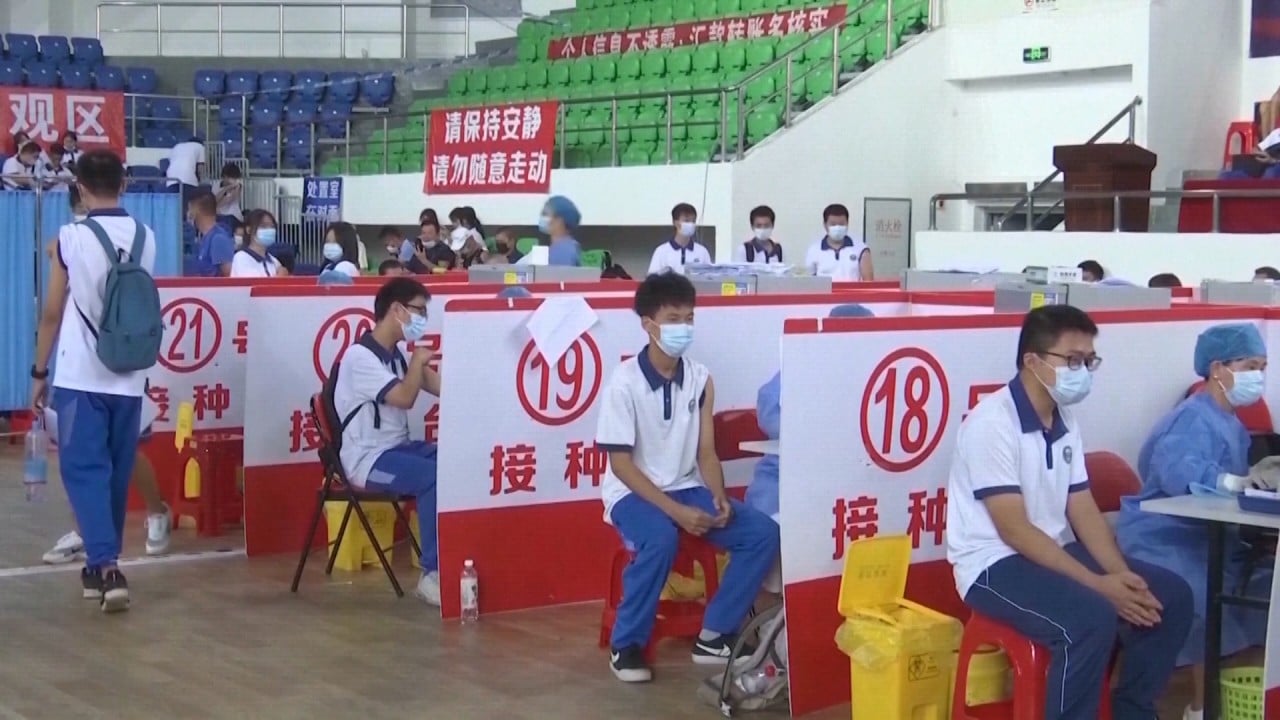
Coronavirus: vaccines, declining antibodies and the immune memory
- Debate is raging over whether booster shots are needed amid reports of waning immunity and breakthrough infections
- But experts say it’s normal for immune response to fade over time after getting vaccinated, and that includes memory cells
Vaccines work to “train” the body to fight a specific pathogen, using inactive or weakened parts of it, or a blueprint of it, to prompt an immune system response. The body then produces antibodies, but also white blood cells known as memory cells. When the antibodies gradually level off, the memory cells remain and swing into action when faced with the real pathogen – a process known as memory response.
According to vaccine experts, it is normal for the immune response to decline after getting any jab.

06:18
SCMP Explains: What’s in a Covid-19 vaccine?
“Elderly people and individuals with various degrees of immune deficiency – induced by illness or by exogenous treatment such as cancer – may not mount a particularly robust response to initial vaccination, and response may also decline more rapidly in these individuals, leaving them at increasing risk from infection and illness as time progresses,” she said.
For some people considered high risk, booster shots might not be enough since they may not respond at all, according to Ward.
“These individuals would be better served by ‘passive’ protection using the monoclonal antibodies becoming available – particularly the long-acting combination being studied by AstraZeneca, where one shot might be sufficient to provide protection for six to 12 months,” she said.
Antibodies bind to pathogens and block them from entering human cells, stopping infection, in a process known as neutralising. These neutralising antibodies are part of working out what level of protection is needed. While a test can be done to see if a person’s immune response is high enough to offer protection against diseases like measles, for example, that level has yet to be determined for Covid-19 – though some studies have come up with estimates based on antibodies in recovered patients.
“The memory B cells might contribute to late-stage protection, relieving severe cases, but to protect an individual from Sars-CoV-2 infection in a severe case, you really need the neutralising antibodies, which is the indicator for protection here and nothing else,” he said. “It’s crystal clear.”
No need for Covid-19 vaccine booster shots in most people yet, scientists find
A decline in antibody levels is normal in the months and years after an infection or vaccination, but it does not mean that the immune system’s memory has faded. Ashley St John, an associate professor at Duke-NUS Medical School, said vaccinated people would still be protected against severe illness.
“While it’s best to have neutralising antibodies, it is also true that they are not the only evidence of immunity after vaccination. As long as a person generated antibodies previously it is likely that they can have [memory] B cells surviving to quickly make antibodies again,” St John said.
“It is likely that the immune system can still respond more quickly if it has been exposed to a vaccine before. This is consistent with what we see for Covid-19 vaccines, where many people have declining antibodies over time, yet we know that there is still very strong protection from developing severe disease.”

01:37
With over 2.19 billion shots in arms, China has fully vaccinated 78 per cent of its population
Facing a surge of breakthrough infections as the highly contagious Delta variant spreads, countries like the US and Israel are offering a third dose for eligible people, six months after their second jab. In the US, that means people aged 65 and over or who are at high risk of severe illness, while Israel has begun giving a third dose to everyone aged 12 and over and said a fourth shot may be needed.
St John said for healthy people – even those who might be more at risk, like health care workers – it was not necessary to have more frequent Covid-19 shots.
“There is not strong evidence that it’s needed in healthy individuals yet. Some vaccines need many boosts and others need just a few,” St John said, adding that more monitoring of immune response and the severity of breakthrough infections was needed. “Vaccines have the potential to protect for many years or to need boosts only every few decades,” she said.
The frequency of vaccination would also depend on the vaccination strategies of countries, according to Ward from King’s College London. “If the objective of vaccination is to reduce infection rates, repeated frequent booster shots might be needed to ensure individuals sustain a high enough level to prevent infection becoming established,” she said. “If the aim is to prevent severe illness or deaths, it may be possible to give booster shots less frequently.”
Both Ward and St John agreed that, if it is successfully developed, a booster against variants that escape the Covid-19 vaccines was also something everyone should be prepared for.

